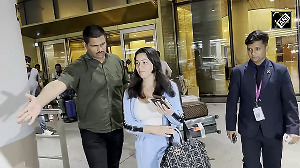In the ongoing Telangana saga, three major aspects have to be acknowledged.
One, the Congress party has got a lot more egg on its face than it had bargained for, and lost its credibility in Telangana as well as the other two regions in the state -- coastal Andhra and Rayalaseema.
Two, political leaders from the rest of Andhra Pradesh are fighting to retain their control over Hyderabad, the country's sixth largest city and the state's capital. On the flip side, the protagonists of Telangana are striving for a separate state of which Hyderabad is an organic part; it cannot be taken away or even shared for logistical reasons.
Three, the backtracking of all political parties, except the muted support by the Bharatiya Janata Party, for the promised statehood, is a great democratic betrayal. The commitments made were apparently pure rhetoric and insincere. They were promises made during the elections and then forgotten.
Instead, the parties changed their stand and have virtually split the state cabinet and the geographical regions, because the Congress unilaterally moved towards statehood. The state government, its own allies at the Centre or the people of Andhra were never consulted. A chief minister technically leads a state, but he may not always speak for his own government, as proved by Andhra CM K Rosaiah's meeting with Sonia Gandhi. Everyone is now facing a credibility crisis.
In Telangana statehood's 40-year-old saga, so much in such a short spell of time has never happened before. This has the potential to reorder the course of politics on a rollercoaster for the entire state if statehood for Telangana is now denied.
Let us deal with the first issue first.
There was no call for Sonia Gandhi to summon the government's key ministers, confabulate and announce late in the night that Telangana was being conceded and the Andhra Pradesh legislature will start the processes. There were no consultations with other stakeholders in that state and the unilateral announcement was made because the party feared chaos if anything happened to the fasting K Chandrasekhar Rao.
This has put the Telangana issue in a Catch-22 situation. The Congress is damned if it carries forward the plan because the revolt in the party is far too strong to be contained easily. The voters are not likely to be subdued even if the state's party leaders are browbeaten into submission.
Betrayal
The Congress is damned if it does not carry forward the plan because Telangana, which had set its heart on statehood some 40 years ago, will never ever again trust the party because of this grand betrayal.
Unless of course all that transpired in New Delhi was a grand plan of offering the state but not really intending to hand it over. The logic is as follows: Telangana can be told tomorrow that since the AP legislature could not adopt the resolution agreeing to the proposed statehood, it was being denied the same. The onus will be technically on the protagonists of Telangana, but the numbers are tilted against them. For the 119 legislators from that region, there are as many as 175 members of the legislative assembly from coastal Andhra and Rayalaseema.
Congress elders in Delhi are wily, hardnosed; they know how to posture and it is remotely likely that such a plan may have been crafted but never articulated openly. To do so openly would have been rubbing salt into the wounds of Telangana.
Let us move to the second issue.
Hyderabad sought
Why is it that Andhra and Rayalaseema leaders are screaming against the intent to hand over statehood to Telangana? None of them have yet spoken of the strong Telugu linguistic bond of the people which requires them all to remain united. That is because it is not an issue at all. The issue is wealth. That is, the wealth that these leaders and their cohorts have accumulated after investing in Hyderabad. This again is something that they cannot speak of openly so other proxy arguments are trotted out.
Hyderabad has grown, in terms of population and geography, to house in its entire metropolitan region some 6.3 million souls, having registered a decadal growth of 29 per cent. It has grown substantially economically too, the growth being in the range of over seven per cent in 2006-07. It has had the wealth of the other regions poured as investment here and the sticky fingers of the politicians cannot easily be pulled out from that pie. The investor-politician nexus is very strong, and even visible, in Hyderabad.
Natural to Telangana
To the Telangana people, Hyderabad is a natural capital and it would be unnatural for the rest of Andhra to access it as a shared capital, having to traverse at least 200 km from the borders of the 10-district strong Telangana. In fact, to consider it to be a potential Union territory to be shared by two states is laughable and such an idea should be rejected straightaway.
Of course, Hyderabad is now on a momentum which would be not easy to reverse, but should a separate state be formed as promised, its pace can slow down. A substantial amount of wealth will move to the new capital, which will be around the coastal region's two major cities, Guntur and Vijayawada.
That does not mean that with the wealth, people from the other Andhras will also migrate back to their earlier places, because those who have come with their wealth, and hopes, have developed strong roots in Hyderabad. The city would not be depopulated voluntarily. However, should the animus grow between the protagonists and the antagonists of the Telangana cause, there could possibly be scary developments, forcing some population shift.
Backwardness
The real story of backwardness is not in Hyderabad, which apparently has the highest gross domestic product in all of Andhra Pradesh. From all accounts, in terms of real investment, the remaining nine districts of Telangana are lagging behind. Hyderabad could be the best destination but that does not make the rest of the region as prosperous as the capital city.
The stories you would hear from the rest of the Telangana districts are the ones that have to be taken note of when judging the entire region -- lower educational attainments, lower educational facilities compared to the rest, poorer employment potential, which make the demand for a state strident.
The third issue is potentially explosive because if the backtracking is permanent, it can create social ripples and lead to problems, given the large population of people from the other two regions in AP.
The promises of yore about bringing Telangana on par with the rest of Andhra Pradesh have been on paper and the intent not honourably translated into reality on the ground. And those who prevented that from happening comprise the very section which is seeking to prevent, with unprecedented defiance, the creation of a new state. All political parties, except the BJP and the Telangana Rashtra Samithi, have gone back on their poll assurances of Telangana's statehood.
In this saga of broken promises, the anxieties and vehemence of Telangana is understandable. But the last word has not yet been said.
Mahesh Vijapurkar is a Thane-based senior journalist and commentator







 © 2025
© 2025